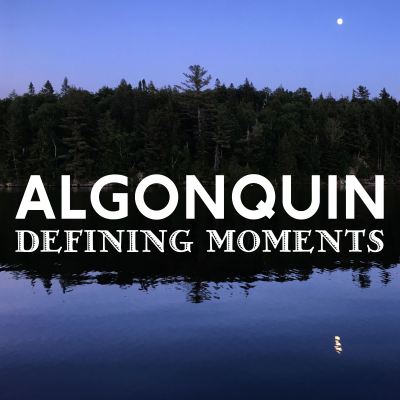
ALGONQUIN DEFINING MOMENTS
Englisch
Kostenlos bei Podimo
Kostenlos hören bei Podimo
Starte jetzt und verbinde dich mit deinen Lieblingspodcaster*innen
- Vertraut von über 1 Mio. deutschen Hörer*innen
- Über 1.000 lokale Podcasts und Shows – nur bei Podimo
- Keine Zahlung nötig
Mehr ALGONQUIN DEFINING MOMENTS
For over 20 years I've been collecting stories, photographs, interviews, out of print books and researching various aspects of the human history of Algonquin Park in Ontario Canada. In other words, capturing voices from the past. In the fall of 2020, I launched my podcast 'Algonquin Defining Moments' to both complement my published books but also to continue my mission of sharing stories, recollections, traditions, landmarks and other fun Algonquin Park human heritage curiosities. In this way that those who share my passion for everything Algonquin Park can listen to snippets of the park and its people while commuting, walking, cooking, working around the house or even just meditating on the back deck. Enjoy! Gaye Clemson
Alle Folgen
70 FolgenEpisode 70: Our Algonquin Park Experiences Part 3
Episode 70: Our Algonquin Park Experiences Part III In this episode I share my experiences at Algonquin Park Children's Camps (Camp Tamakwa on South Tea Lake and Camp Wapomeo on Canoe Lake) and Rory shares his experiences working as a summer naturalist and his later work helping establish the Archives and undertaking various archeological projects in and around the Park. We both then share some ot the details as to why we had to leave and our lives now.
Episode 69: Our Algonquin Experiences - Part II
Episode 69: Our Algonquin Experiences - Part II This is the second of 3 episodes capturing the experiences of Gaye Clemson and Rory MacKay who were blessed to be able to spend the summers of their youth on Canoe Lake and Lake of Two Rivers respectively. It is dedicated to Brock Easterling, who suggested that this would a fun topic for our listeners. In this episode we focus on Canoe Lake’s 1960s social life, the challenges of mice and bears, canoe trips and park visitors. Key References include: * Reminiscences of Gaye Clemson and Rory MacKay as well as the following publications: * The Canoe Lake Chronicles (published privately 2001 by Gaye Clemson * Treasuring Algonquin: Settlement Stories of 100 Years of Leaseholding by Gaye Clemson The musical interlude is called Whispering Pines from Dan Gibson’s Solitudes Lakeside Retreat CD. It is brought to you with the approval of Digital Funding LLC. Solitudes music can be found wherever you get your music streaming.
Episode 68: Our Algonquin Experiences Part 1
Episode 68: Our Algonquin Experiences Part 1 This is the first of three episodes capturing the experiences of Gaye Clemson and Rory MacKay who were blessed to be able to spend the summers of their youth and most of their adult lives as leaseholders on Canoe Lake and Lake of Two Rivers respectively. Key References include: * Reminiscences of Gaye Clemson and Rory MacKay as well as the following publications: * The Canoe Lake Chronicles (published privately 2001 by Gaye Clemson * Treasuring Algonquin: Settlement Stories of 100 Years of Leaseholding by Gaye Clemson The musical interlude is called Lakeside Retreat from Dan Gibson’s Solitudes Lakeside Retreat CD. It is brought to you with the approval of Digital Funding LLC. Solitudes music can be found wherever you get your music streaming.
Episode 67: Childrens' Camp Founders
Episode 67: Childrens' Camp Founders In this episode I share profiles of many of the founders of the key childrens’ camps in Algonquin Park including Fanny Case from Camp Northway and Wendigo on Cache Lake, Franklin Gray, William Bennett and Herman Norton from Camp Pathfinder on Source Lake, Taylor and Ethel Statten from Camp Ahmek and Camp Wapomeo on Canoe Lake, Mary Jean Hamilton from Camp Tanamakoon on Lake Tanamakoon, Lillian Kates from Camp Arrohon on TeePee Lake and Lou Handler and Omer Stringer from Camp Tamakwa on South Tea Lake. Key References include: * Summer Camp, Great Camps of Algonquin Park by Liz Lundell, Beverley Bailey, John Taylor and Robbie Sprules; * Taylor Statten A Biography by C. A. M. Edwards, * Talks to Counselors by Hedley S. Dimock and Taylor Statten, * The Nurture of Nature: Childhood, Antimodernism and Ontario Summer Camps 1920-1955 by Sharon Wall and * A History of the Taylor Statten Camps 1985 Masters Thesis by Donald Alexander Burry * The-South-Tea-Echo-Issue-21-Summer-2023-Version-for-Tamakwa-website * Camp Wabuno Brochure provided by Elizabeth Otto The musical interlude is called Time Stands Still from Dan Gibson’s Solitudes Lakeside Retreat CD. It is brought to you with the approval of Digital Funding LLC. Solitudes music can be found wherever you get your music streaming.
Episode 66: Part II - Evolution of Logging in Algonquin Park Since 1922
Episode 66: Part II - How Logging in Algonquin Park has Evolved over a Century (1922-Present) This follow-on episode shares how logging dramatically changed in 1974 when the Algonquin Park Master Plan came into being and created the Algonquin Forest Authority. They were now responsible for all tree marking, harvesting, delivery to sawmill operators in the area, and later all of the silviculture efforts. Key References: * Donald Lloyd’s Algonquin Harvest: The History of the McRae Lumber Company 2006 * Roderick MacKay’s Algonquin Park: A Place Like No Other 2018 * Bob Lyons Whitney: Island in the Shield 1986 * Algonquin Park Forest Authority’s Annual Reports (2021-22 and 2022-23) * Algonquin Park Forest Authority Website (www.algonquinforestry.on.ca [http://www.algonquinforestry.on.ca/]) * Maintaining the Balance in Algonquin Park: Algonquin Forest Authority and the Use of Portable Bridges – Forestry Success Stories 2015 The musical interlude for this episode is called Standing Tall and comes from Dan Gibson’s Solitudes Breaking Through the Mist CD. It is brought to you with the approval of Digital Funding LLC. Solitudes music can be found wherever you get your music streaming.















































